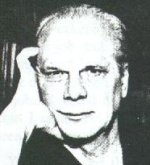
| Nothing Burns in Hell | |||||||||||||||
| Philip José Farmer | |||||||||||||||
| Tor Books, 228 pages | |||||||||||||||
|
A review by Todd Richmond
Nothing Burns in Hell starts out as a pulp detective novel and ends as a pulp detective novel. And in case you're
wondering, everything in between is pulp detective novel -- and it's all a fantastic read.
The story begins with an introduction to our detective,
Thomas Gresham Corbie, a financially strapped private investigator.
Very early on, we are given an
indication of how he operates. Faced with some noisy neighbours and an unhelpful landlord, Corbie decides to take matters
into his own hands. He sends a "care" package to his absentee landlord, and sabotages his neighbours' stereo by cutting off the prongs on the
electrical plug and gluing the plug back into the socket. His struggles with the neighbours continue throughout the book
and constitute an amusing subplot.
The real story begins with Corbie accepting a job to guard a mysterious woman
as she makes a payoff to some blackmailers. Though Corbie usually works legitimately for Mimi Rootwell, his tough-as-nails boss, sometimes
she refers clients to him for jobs that her agency will not handle. In this case, the deal is shady but Corbie needs the money. Not to pay off his bookie or a loanshark, but to pay for some rare books
that he purchased. After a series of adventures and turn-arounds, Corbie
ends up with the blackmail money. But he's a man of principle -- while he keeps the money, in the end he pays the
taxes on it.
That job complete, he moves on to the main case. Simon Alliger, head of the richest family in Peoria, wants Mimi's
firm to uncover any scandalous information they can find about Diana, their daughter-in-law. He and his wife disapprove of
the match and want to find some way to convince their son to divorce her quickly.
When Corbie sets out to investigate Diana's past,
what follows is a tale of blackmail, mystery, murder, and torture. To say more would give away too much. But I will
say that everything ties together and the mysterious woman from the beginning turns up again.
Nothing Burns in Hell is a detective novel, not as hard-boiled as Robert Parker's Spencer novels or
Mickey Spillane's Mike Hammer books, but certainly along those lines. Thomas Corbie is a bit more complex
than your average PI. As his boss, Mimi, puts it:
Via Corbie, Farmer throws in interesting tidbits here and there throughout the book -- a discussion about God and
religion in one place, Indian legends in another, and trivia about Peoria and Illinois. Perhaps the biggest bit of
trivia is the title itself. What does the title, "Nothing Burns in Hell", mean? It's taken from the
Theologia Germanica:
For the more a man followeth after his own self-will, and self-will groweth in him, the farther off is he
from God, the true Good, for nothing burneth in hell but self-will."
People are their own worst enemy. And this is certainly seen in many of the characters in this book.
Overall, I really enjoyed this book. The action keeps the book moving along and Farmer keeps you guessing until the
end. But if the following lines don't appeal to you, you should probably avoid this book:
Todd is a plant molecular developmental biologist who has finally finished 23 years of formal education. He recently fled Madison, WI for the warmer but damper San Francisco Bay Area and likes bad movies, good science fiction, and role-playing games. He began reading science fiction at the age of eight, starting with Heinlein, Silverberg, and Tom Swift books, and has a great fondness for tongue-in-cheek fantasy Óla Terry Pratchett, Craig Shaw Gardner and Robert Asprin. | ||||||||||||||
|
|
If you find any errors, typos or other stuff worth mentioning,
please send it to editor@sfsite.com.
Copyright © 1996-2014 SF Site All Rights Reserved Worldwide
